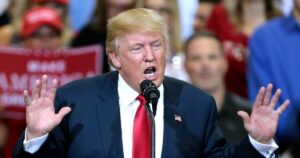Harvard denies Trump's funding requirements
In a bold move this week, Harvard University rejected a series of demands from the Trump administration that threatened its federal funding. The institution stood firm against changes that it deemed an infringement on university independence and constitutional rights.
The demands are part of a larger Trump administration initiative aiming to enforce policy changes in higher education institutions, citing a need for stronger action against campus antisemitism. The administration's push for reform follows the tension and public outcry after a Hamas attack on Israel in October 2023. In response, several changes were proposed, including administrative restructuring, modifications to protest permissions, and overhauls in hiring practices.
Harvard communicated its decision on Monday through a message sent to its allies and a letter drafted by its legal representation addressed to government officials. The proposed demands encompassed a broad array of institutional changes, including audits, and reforms in diversity, equity, and inclusion initiatives. Additionally, there was a mandate for Harvard to submit quarterly summaries detailing progress until 2028.
University's commitment to self-initiated actions
The Trump administration has been vigilant in its enforcement of what it perceives as civil rights violations by elite universities. It has previously cut or paused funding on numerous occasions, often citing insufficient action against issues such as antisemitism or policies affecting transgender athletes. The federal government's demand for Harvard included significant structural reforms, some of which involved leadership changes across several departments.
Harvard's response emphasized its ongoing initiatives to combat discrimination without federal intervention. The university highlighted its commitment to addressing these sensitive issues internally. Its legal team expressed that compliance with these demands would circumvent the institution's First Amendment rights and undermine its freedom.
The current administration's approach bypasses established processes meant to give institutions time to address alleged breaches. This controversial method has raised concerns about overreach and the bypassing of legal rights traditionally afforded to educational bodies. The administration is presently investigating Harvard's contracts amounting to $9 billion with federal entities.
Legal challenges and educational independence
“No government — regardless of which party is in power — should dictate … private universities,” said President Alan Garber in defense of the institution’s autonomy. This sentiment was echoed by Harvard's legal team, who asserted that the university’s independence and constitutional rights would not be surrendered under any administration. The legal representatives contended that certain demands violated Harvard’s statutory rights.
President Garber elaborated, suggesting that real progress in combating antisemitism requires more than federal coercion. He asserted that addressing these challenges is a community-driven responsibility deeply embedded within the institution’s values and purpose. The university believes in defining and undertaking its obligations collectively.
Meanwhile, a similar scenario played out with Columbia University, which altered its policies in accordance with federal demands. However, this concession did not lead to the immediate restoration of its federal funding, and instead, it suffered additional financial reductions.
Resistance against federal overreach
“Harvard remains open to dialogue” regarding its current and future actions on enhancing the community experience, assured its legal team. Yet, the institution is not willing to accept regulations it contends overstep the legal boundaries of governmental authority. These statements emphasized a willingness to communicate but not at the cost of university independence.
This ongoing tension between private universities and federal authorities reflects broader national debates over academic freedom and the role of government in education. The Trump administration has asserted its aggressive stance on enforcing civil rights within educational institutions, a policy approach that has garnered both support and criticism across the spectrum.
Harvard University views these demands as contrary to the lawful processes explicitly designed by Congress. By enforcing these immediate changes, the administration's approach diverges from recognized methods that allow for institutions to remedy alleged violations thoughtfully and legally.
Future implications for higher education
In resisting federal demands, Harvard has boldly declared its commitment to maintain educational independence. This stance not only challenges the current administration's method but also sets a potential precedent for how other universities may interact with governmental pressure in the future.
By prioritizing internal policy reforms over government-mandated changes, Harvard positions itself as a leader in defending university autonomy across the nation. As this situation unfolds, many will closely watch the impact on academic freedom and federal funding dynamics.
Ultimately, whether this firm rejection will shield Harvard from further financial scrutiny or spark further punitive measures remains uncertain. Yet, for now, the university continues to emphasize its foundational principles of teaching, learning, and community cohesion, irrespective of outside influence.




